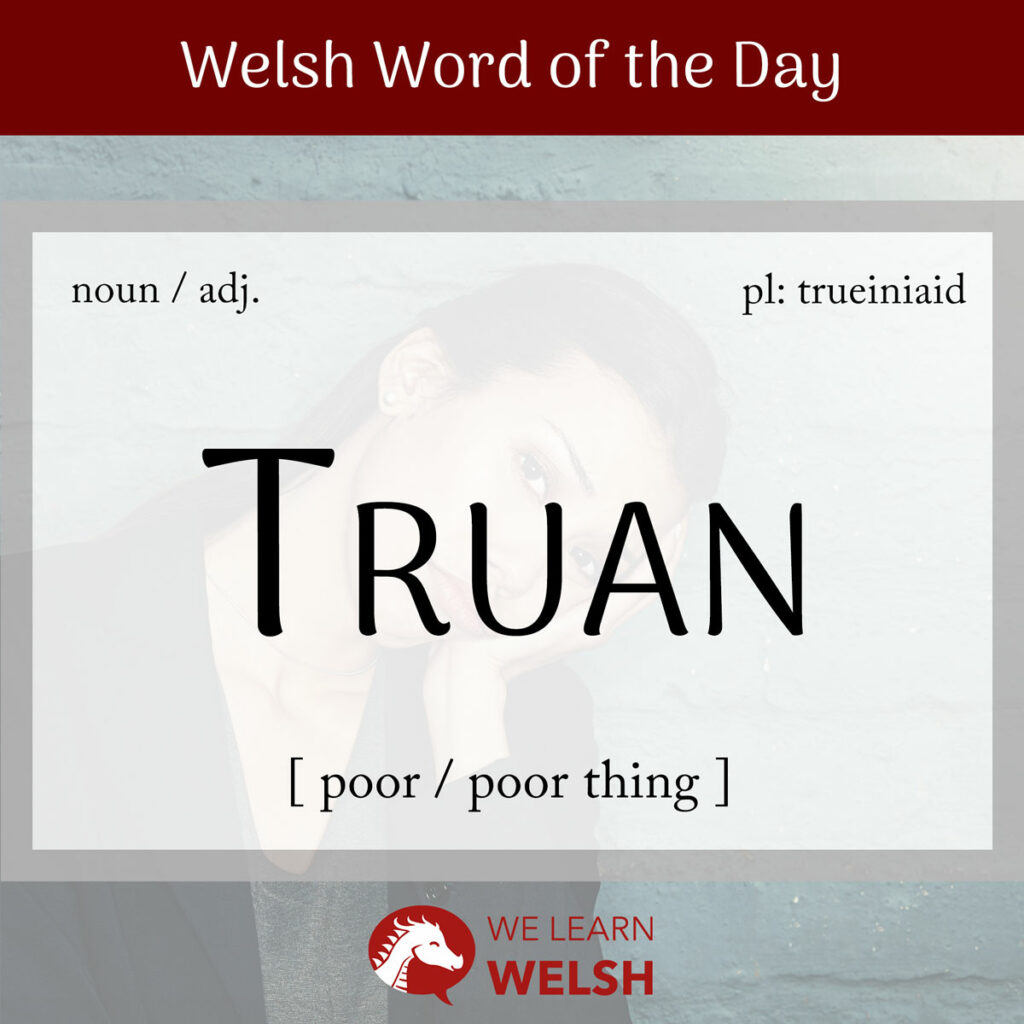One of my worst habits is that at any minor inconvenience, I always make my friends say druan o Nia (poor Nia). Truan – mutated to druan in that example – is a Welsh adjective and noun, meaning poor as in miserable or pitiable, or poor thing. The plural form of truan as a noun is trueiniaid.
truan
poor / poor thing
If you want to talk about being poor in terms of money and possessions, you’d instead need to use the word tlawd. However, truan, which comes from the adjective tru meaning wretched / miserable, is a great word in its own right! Some even think that the English word truant may have come from the same Celtic root.
One thing to watch out for with this word is that, as I mentioned earlier, it often appears as druan instead. This is its soft-mutated form, which is the most common. However, it’s technically subject to all three mutations, as shown below:
Soft mutation
druan
Nasal mutation
nhruan
Aspirate mutation
thruan
The reason that truan becomes druan in expressions like druan o Nia or o, druan bach (oh, poor little thing) is that it’s being used vocatively. This means that it’s a sort of interjection, or exclamation.
However, if you were using truan in the sentence she’s a poor thing, you would still have to mutate it to mae hi’n druan, as here the preposition yn causes it to mutate.
There are quite a few Welsh words that appear more often in their mutated forms than in their basic forms. For example, pant (meaning “small valley”) is most commonly encountered in the phrase i bant (“away”). Similarly, parod (meaning “ready”) is frequently seen as yn barod (“already” or “ready” when referring to a person).
Stori hollol erchyll ydy o. Druan ohoni hi.
It’s a totally dreadful story. Poor her.
As a noun in ordinary contexts, truan is best translated as poor thing or a miserable / pitiable person. It becomes either masculine or feminine depending on the gender of the person it describes. You could use a separate feminine form, truanes (pl: truanesau). As an adjective, it means poor or pitiable, with truenus being a more common synonym.

But I have to emphasise that it doesn’t really get used in either way very often – it almost always appears in vocative phrases. Here are some of the many, many ways to say poor thing in Welsh:
- druan bach
- och o druan
- druan ohono (m)
- druan ohoni (f)
- yr hen druan
- yr hen dlawd
- y creadur
- druan ag ef (m)
- druan â hi (f)
- pŵr dab
This last phrase is very very Southern, and as you can see comes from the English poor. For this reason it’s also a very common phrase amongst English speakers in Wales – and a good way to tell if someone’s Welsh when you’re speaking Saesneg (English).
Since druan is an adjective, you can directly describe someone with it, too, as in Tom druan (poor Tom).
Aside from truenus, another important related word is trueni. This means misery / wretchedness or pity, and can sometimes refer to someone who is the object of pity. It probably comes up most commonly in colloquial Welsh in the phrases am drueni and dyna drueni, which mean what a shame. You can also just exclaim trueni! (pity!)
Mae’n druenus o hwyr.
It’s regrettably late.
Let’s take a brief look at some other useful Welsh words to do with the theme of pity.
- trugaredd = compassion
- tosturi / piti = pity / compassion
- pitïo = to pity
- anffodus = unfortunate
- yn anffodus / ysywaeth = regrettably
- gwael = wretched
- gresyn = misery / misfortune
- gresynus / alaethus = lamentable
- edifar = regretful
So now you know quite a few new ways to feel sorry for yourself yn y Gymraeg (in Welsh)!

